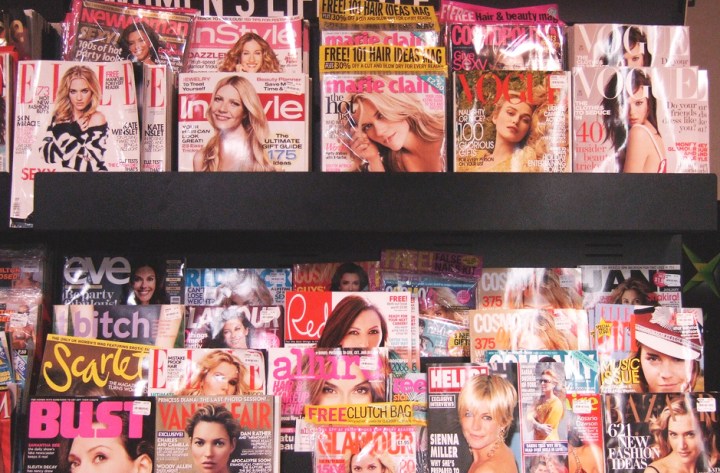Media
What women want from women’s magazines

Women’s magazines are better known for changing lip colours than changing legislation. Yet, a new project from the Avusa-owned Elle magazine seeks to re-address the continuing imbalances between men and women in South Africa by submitting a White Paper to parliament. Is this laudable move also showing just how the women's magazines need to change to remain relevant? By KHADIJA PATEL.
Emboldened by the success of the Italian and French versions of Elle with similar initiatives, Elle has launched the Female Factor Forum, a project that seeks to address women not as the mythological products of glossy paper, but living, breathing creatures. The wheels on the Female Factor Forum were set in motion in June with the launch of an online survey querying the challenges of women in South Africa when it comes to the workplace, female sexuality, motherhood, physical appearance, entrepreneurship and an ever-elusive work-life balance.
The Female Factor Forum, set to be a year-long project that will include focus group meetings as well as print and online polls and televised debates on women’s lives in South Africa, has been a pet project of Elle editor, Jackie Burger.
“We have a huge responsibility towards our readers, to help them live a better life,” Burger explains. It is a commitment that has already captured the attention of minister for women, children and persons with disabilities Lulu Xingwana. Speaking at the launch of the Forum, she said, “The survey speaks to some of the key issues that are currently key priorities for the ministry of women including, the risk and reality of gender-based violence, equality and freedom of women to exercise their rights, progression of women and representation of women in decision making in both the public and private sector, among others.”
Jen Thorpe, feminist writer and the editor of Feminists SA, believes the survey does well to include issues of women’s careers and their concerns for the environment, but is disappointed by an omission of concern about “violence against women generally and not contained to the context of domestic violence”. Thorpe highlights as well that the survey targets specifically Elle’s core readership so issues of “poverty, access to employment and to health care are not well analysed”. Women’s magazines, however, make up an essential chunk of the media landscape in South Africa and Thorpe feels that “they have a huge role to play in terms of providing access to information about women’s rights, and services available to them if these rights are violated”.
“I find that women’s magazines in general are really disappointing in creating messages around women’s causes,” says Thorpe and, “don’t accurately reflect the multiple dimensions of identity in women’s lives. Most women’s magazines in South Africa don’t look at what it means to be a South African woman, and in that way they can’t champion causes.” Elle, however, believes the survey enables it to better connect with its readers. “As the findings unfold we will use them in the magazine and Elle blog to render content around the issues impacting on women and by doing this enter into a relationship where she can have continued dialogue with Elle.”
Elle then has all the appearance of charting a new course for women’s magazines in South Africa, but a former magazine insider, Nechama Brodie, as the former assistant editor of Fair Lady, believes “readers are less likely to want to take home a magazine promising to reveal the truth about dead babies than one which promises flatter abs in 10 days”. Brodie disagrees with a demand for glossy magazines to have a greater social conscience. “They are, first and foremost, there to entertain. When women’s magazines become too focused on serious issues – I call this being too worthy – that’s a definite switch-off for readers, and if the worthiness is sustained it usually results in a dramatic drop in readership,” Brodie says.
Taryn Gill, project manager of Elle’s Female Factor Forum, continues to believe that what the Female Factor project is “trying to achieve will change the way South African consumers interact with their magazines – it has the ability to shift the perception of women’s magazines ‘dumbing down’ with fluffy content and impossibly skinny models”. Nechama Brodie disagrees that the “dumbing down” of content is specific to women’s magazines. “I think print media as a whole is guilty of embracing tabloid journalism.” Under threat from a burgeoning online media industry, Brodie believes print media in retaliation “tried to mimic what it viewed as successful content formulae on virtual platforms”.
The latest Nielsen Women of Tomorrow study which examines what women watch and buy in 21 developed and emerging countries, including South Africa, reveals that a principal driver of brand loyalty for women is quality. “The magazines that will survive over-crowded shelves are the publications that understand what the female consumer wants and gives it to her. Women want honesty, truth and empowering content that can help them in their daily lives,” says Taryn Gill. DM
Photo: Jamielondonboy


















 Become an Insider
Become an Insider